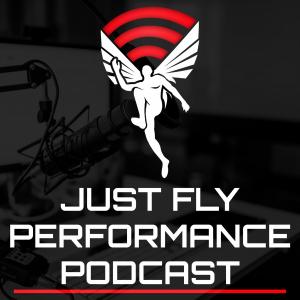Just Fly Performance Podcast

Dr. Chris Gaviglio on Building Strength and Maximizing Recovery with Blood Flow Restriction Training
Today’s show features Dr. Chris Gaviglio. Chris is a current senior strength and conditioning coach for the Queensland Academy of Sport, working with Olympic-based sports and athletes. Chris has been involved with elite sport for over 15 years working across multiple Olympic sports and professional football in both the northern and southern hemispheres. Chris provides applied sports science projects for the athletes he works with, particularly in the areas of salivary hormones, passive heat maintenance, blood flow restriction training, warm-up strategies, and power/strength development. I don’t often do shows that center around a piece of training technology, and the main reason for that is simply accessibility. If a training tool costs thousands of dollars, it isn’t something a large proportion of the athletic, and even coaching population can rationalize having in their training arsenal. The nice thing about blood flow restriction training is that it is available at a relatively low price point, with common units starting around $300USD. Other setups using squat wraps, for example, can be done basically for free, but I would recommend using an automated system for the safety and precision of band tightness (see show notes regarding safety considerations and contraindications to BFR, such as concussions or deep vein thrombosis). Blood Flow restriction training has been a training tool that has been on my radar for a long time. After seeing the results that a high-level Olympic swimmer I worked with got from them, and then hearing some results from Nicolai Morris having a 1.5 second drop in the 100 freestyle of a swimmer as well, as well as several of my coaching colleagues using the method, I knew that there was absolutely something to BFR that I needed to get further into. In using the AirBands from Vald performance myself, I continued to realize how beneficial this training stimulus is to our physiological response. For today’s show, Chris takes us into many topics of BFR, including its mechanisms and many benefits. As opposed to methods of mechanical stress (such as plyometrics, sprinting, heavy strength training methods) which tend to dominate this shows podcasts) BFR is a physiological stressor, and through this discussion, we can gain an appreciation for the contrast of physiological stress to more mechanical means. Chris finishes the show talking about how coaches and athletes can integrate BFR training, and gives many anecdotes and points of research, on how BFR can improve strength and speed recovery. Finally, our sponsor, Simplifaster is doing a Blood Flow Restiction cuff giveaway (Vald Airbands) so if you would like to get in on that, until November 11th, you can sign up for a chance to win a free pair of cuffs at bit.ly/freebfr . Today’s episode is brought to you by SimpliFaster and Lost Empire Herbs. For 15% off your Lost Empire Herbs order, head to www.lostempireherbs.com/justfly View more podcast episodes at the podcast homepage. Timestamps and Main Points 6:00 – Chris’s experiment during quarantine using lighter, or minimal weights in an at-home training setting 17:00 – Discussion on using lighter implements and bodyweight in developing one’s athleticism 20:30 – What blood flow restriction training is, and where it originated from 27:00 – How the metabolic stress from BFR creates beneficial responses, similar to high-load lifting 35:25 – What BFR definitely helps with, and what elements of performance it is not as helpful for 41:25 – How BFR can help with creating “mild to moderate” doses of lactate – Using BFR style work in warming up for a training session 53:10 – If there are any similar places in sport where athletes will experience situations similar to what is created with BFR means 57:00 – How to get as close to BFR as one can in a gym without any sort of cuffs or wraps 1:00:00 – Anecdotes on how to integrate BFR in performance and re...






 Visit Podcast Website
Visit Podcast Website RSS Podcast Feed
RSS Podcast Feed Subscribe
Subscribe
 Add to MyCast
Add to MyCast